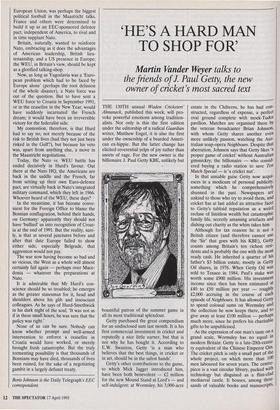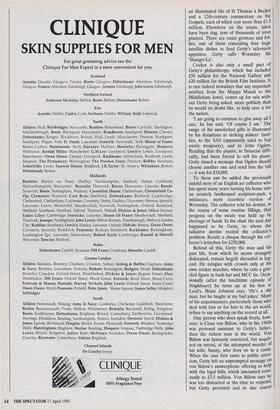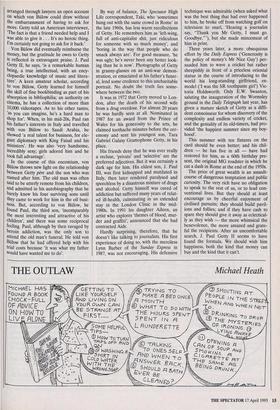`HE'S A HARD MAN TO SHOP FOR'
Martin Vander Weyer talks to the friends of J. Paul Getty, the new
owner of cricket's most sacred text
THE 130TH annual Wisden Cricketers' Almanack, published this week, will pro- voke powerful emotions among tradition- alists. Not only is this the first edition under the editorship of a radical Guardian writer, Matthew Engel, it is also the first under the ownership of a bearded Ameri- can ex-hippie. But the latter change has elicited reverential yelps of joy rather than snorts of rage. For the new owner is the billionaire J. Paul Getty KBE, unlikely but bountiful patron of the summer game in all its most traditional splendour.
Getty purchased the great compendium for an undisclosed sum last month. It is his first commercial investment in cricket and reputedly a nice little earner, but that is not why he has bought it. According to E.W. Swanton, Getty 'is a man who believes that the best things, in cricket or in art, should be in the safest hands'.
Getty's other contributions to the game, to which Mick Jagger introduced him, have been both benevolent — £2 million for the new Mound Stand at Lord's — and self-indulgent: at Wormsley, his 3,000-acre estate in the Chilterns, he has had con- structed, regardless of expense, a perfect oval ground complete with mock-Tudor pavilion. Matches are organised there 11 the veteran broadcaster Brian Johnson, with whom Getty shares another even more unlikely passion, watching the Aus- tralian soap-opera Neighbours. Despite that aberration, Johnson says that Getty likes 'a proper game of cricket' without Australian gimmickry; the billionaire — who consid- ered buying a .radio station to save Test Match Special — is 'a cricket nut'. In that amiable guise Getty now acqui- esces in a modicum of personal publicity, something which he comprehensively shunned in the past. Newspapers are unkind to those who try to avoid them, and cricket has at last added an attractive facet to Getty's tabloid reputation as a weird recluse of limitless wealth but catastrophic family life, secretly amassing artefacts and dishing out charity as the whim takes him.
Although for tax reasons he is not a British citizen (and therefore cannot use the 'Sir' that goes with his KBE), Getty counts among Britain's ten richest resi- dents and is probably the one with the most ready cash. He inherited a quarter of his father's $3 billion estate, mostly in Getty Oil shares, in 1976. When Getty Oil was sold to Texaco in 1984, Paul's stake was worth some £900 million. His investment income since then has been estimated at £40 to £50 million per year — roughly £2,000 accruing in the course of each episode of Neighbours. It has allowed Getty to spend colossal sums on Wormsley and the collection he now keeps there, and to give away at least £100 million — perhaps much more, since he prefers his charitable gifts to be unpublicised.
As the expression of one man's taste on .a grand scale, Wormsley has no equal In modern Britain: Getty is a late-20th-centu- ry equivalent of the Chinese Emperor Oin. The cricket pitch is only a small part of the whole project, on which more than 100 men laboured for seven years. The centre- piece is a vast circular library, packed with technology but disguised as a flint-clad mediaeval castle. It houses, among thou- sands of valuable books and manuscripts, an illuminated life of St Thomas a Becket and a 12th-century commentary on the Gospels, each of which cost more than £1.3 million. Elsewhere on the estate, lakes have been dug, tens of thousands of trees planted. There are rustic grottoes and fol- lies, one of them concealing four huge satellite dishes to feed Getty's television appetites. Getty calls Wormsley his 'Shangri-La'. Cricket is also only a small part of Getty's philanthropy, which has included £50 million for the National Gallery and £20 million for the British Film Institute. It is rare indeed nowadays that any important artefact, from the Mappa Mundi to the Middleham Jewel, comes up for sale with- out Getty being asked, more publicly than he would no doubt like, to help save it for the nation.
`I am going to continue to give away all I can,' he has said. 'Of course I am.' The range of his unsolicited gifts is illustrated by his donations to striking miners' fami- lies, to the SAS (apparently used to buy exotic weaponry), and to John Ogden. Reading that the pianist, in financial diffi- culty, had been forced to sell his piano, Getty issued a message that Ogden should choose another one and send him the bill — it was for £18,000.
To these can be added the previously untold story of an English art collector who has spent many years turning his home into an ornately landscaped sculpture-park, a miniature, more eccentric version of Wormsley. The collector told his dentist, in the course of some routine fillings, that progress on the estate was held up by shortage of funds. In the chair the next day happened to be Getty, to whom the talkative dentist recited the collector's problem. Result: a cheque through the col- lector's letterbox for £250,000.
Behind all this, Getty the man and his past life, from which he seems strangely dislocated, remain largely shrouded in leg- end. He mingles with crowds only at his own cricket matches, where he cuts a griz- zled figure in bush hat and MCC tie. Occa- sionally (after the lunchtime episode of Neighbours) he turns up at his box at Lord's. Brian Johnson says, 'He's a shy man, but he laughs at my bad jokes.' Many of his acquaintances, particularly those who deal with him or for him in the art world, refuse to say anything on the record at all.
One person who does speak freely, how- ever, is Claus von Billow, who in the 1960s was personal assistant to Getty's father, then the richest man in the world. Von Billow was famously convicted, but acquit- ted on retrial, of the attempted murder of his wife, Sunny, who lives on in a coma. When the case first came to public atten- tion, Getty left an unprompted message on von Billow's answerphone offering to help with the legal bills, which amounted even- tually to £3.5 million. Von Billow says he was too distracted at the time to respond, but Getty persisted and in due course
arranged through lawyers an open account on which von Billow could draw without the embarrassment of having to ask for more. Getty told an American interviewer, 'The fact is that a friend needed help and I was able to give it . . . It's no heroic thing. I'm certainly not going to ask for it back.'
Von Billow did eventually reimburse the money, but the gratitude he owes to Getty Is reflected in extravagant praise. J. Paul Getty II, he says, 'is a remarkable human being, a true intellectual, with an ency- clopaedic knowledge of music and litera- ture'. A keen amateur scholar, according to von Billow, Getty learned for himself the skill of fine bookbinding as part of his absorption in bibliophilia; an authority on cinema, he has a collection of more than 10,000 videotapes. As to his other tastes, 'as you can imagine, he's a hard man to shop for'. When, in his mid-20s, Paul ran his father's interests in Italy and travelled with von Billow to Saudi Arabia, he showed 'a real talent for business, for ele- gant diplomacy with King Faisal and his ministers'. He was also 'very handsome, incredibly sexy; girls adored him and he took full advantage'.
In the course of this encomium, von Billow throws new light on the relationship between Getty pere and the son who was named after him. The old man was often said to be utterly remote from his children, and admitted in his autobiography that he barely knew his four surviving sons until they came to work for him in the oil busi- ness. But, according to von Billow, he found Paul, the third son, 'incomparably the most interesting and attractive of his children', and there was some reciprocal feeling. Paul, although by then ravaged by heroin addiction, was the only son to attend the old man's funeral. He told von Billow that he had offered help with his trial costs because 'it was what my father Would have wanted me to do'. By way of balance, The Spectator High Life correspondent, Taki, who 'sometimes hung out with the same crowd in Rome' in the late 1960s, has less warm recollections of Getty. He remembers him as 'left-wing, full of anti-capitalist shit, just ridiculous for someone with so much money', and 'boring in the way that people who do smack always are'. For good measure, 'he was ugly; he's never been any better look- ing than he is now'. Photographs of Getty in granny-glasses on an anti-war demon- stration, or emaciated at his father's funer- al, lend some credence to this uncharitable portrait. No doubt the truth lies some- where between the two.
It was in 1972 that Getty moved to Lon- don, after the death of his second wife from a drug overdose. For almost 20 years he was hardly seen at all. Nominated in 1987 for an award from the Prince of Wales for his generosity to the arts, he claimed toothache minutes before the cer- emony and sent his youngest son, Tara Gabriel Galaxy Gramophone Getty, in his place. His friends deny that he was ever really a recluse, 'private' and 'selective' are the preferred adjectives. But it was certainly a dark age for him. His eldest son, J. Paul III, was first kidnapped and mutilated in Italy, then later rendered paralysed and speechless by a disastrous mixture of drugs and alcohol. Getty himself was cured of addiction but suffered many years of relat- ed ill-health, culminating in an extended stay in the London Clinic in the mid- 1980s. In 1991 his daughter Aileen, an artist who explores 'themes of blood, mur- der and graffiti', announced that she had contracted Aids.
Hardly surprising, therefore, that he doesn't like talking to journalists. His first experience of doing so, with the merciless Lynn Barber of the Sunday Express in 1987, was not encouraging. His defensive technique was admirable (when asked what was the best thing that had ever happened to him, he broke off from watching golf on television to snarl, 'Hearing a journalist say, "Thank you Mr Getty, I must go. Goodbye." '), but she made mincemeat of him in print.
Three years later, a more obsequious effort by the Daily Express ('Generosity is the policy of money's Mr Nice Guy') per- suaded him to wave a cricket bat rather sheepishly in front of a priceless oriental statue in the course of introducing to the world his long-standing girlfriend, ex- model ('I was the SR toothpaste girl') Vic- toria Holdsworth. Only E.W. Swanton, saluting the inauguration of the Wormsley ground in the Daily Telegraph last year, has given a mature sketch of Getty as a diffi- dent connoisseur for whom discovery of the complexity and endless variety of cricket, and the geniality of its old-timers, had pro- vided 'the happiest summer since my boy- hood'.
This summer with ten fixtures on the card should be even better; and his chil- dren — he has five in all — have had restored for him, as a 60th birthday pre- sent, the original MG roadster in which he cut a dash in Rome at the end of the 1950s.
The price of great wealth is an assault- course of dangerous temptation and public curiosity. The very rich have no obligation to speak to the rest of us, or to lead con- ventional lives. But they should at least encourage us by cheerful enjoyment of civilised pursuits; they should build pavil- ions and follies; and if they have cash to spare they should give it away as eclectical- ly as they wish — the more whimsical the benevolence, the more amazed and grate- ful the recipients. After an uncomfortable search, J. Paul Getty II seems to have found the formula. We should wish him happiness, both the kind that money can buy and the kind that it can't.




















































 Previous page
Previous page